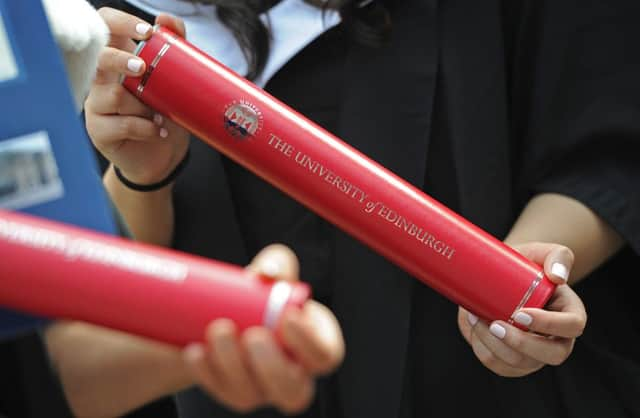Postgrad students should have loans paid - report


The proposal for postgraduate student loans to be reduced or written off by the Scottish Government would not apply to English, Welsh and Northern Irish students studying for a second degree in Scotland – even if they choose to stay.
A review into postgraduate studies led by Professor Bryan MacGregor, vice principal of Aberdeen University, recommends that Scottish domiciled postgrads should be entitled to a £9,000 annual loan to cover £4,594 course fees and £4,500 living costs.
Advertisement
Hide AdAdvertisement
Hide AdThe report was commissioned by the Scottish Government and ministers are now considering its proposals, which could cost the taxpayer at least £150 million per year.
Prof MacGregor’s paper argues that the cost of writing off loans would be more than compensated for by the benefits to the economy of Scotland retaining highly educated individuals.
Last night, opposition politicians questioned the cost and raised concerns that the exclusion of students from south of the Border could prove “discriminatory”.
The recommendation by the “Taught Postgraduate Study Working Group” was one of several designed to encourage increasing numbers of postgraduates to stay in Scotland. It also aims to encourage more people from poorer backgrounds to do postgraduate degrees.
The report said: “The working group recommends that the Scottish Government should consider the feasibility of implementing an incentive system where students, in receipt of financial support from the government to fund postgraduate study, pay back a reduced amount or have their student loan debt cancelled on the basis of gaining employment and making a positive contribution to the Scottish economy. Specifically, this relief would be available to those registered as Scottish income taxpayers.”
Prof MacGregor said the proposal would be seen as “radical”, but that it argued that the benefits of a “clear and universal entitlement to student-loan support... for Scottish domiciled students” outweighed the costs.
The report said: “Participation in postgraduate study provides benefits to students in terms of increased earning potential and improved labour market competitiveness. It also provides wider economic benefits and, if such a scheme were adopted, although there would be a cost in terms of cancelling student loans, this would be offset by wider economic benefits of high-earning taxpayers living and working in Scotland.”
Between 2004-5 and 2013-14, the total number of Scottish students enrolled in a postgraduate course in Scotland fell by 2,230 students, equivalent to around 10 per cent.
Advertisement
Hide AdAdvertisement
Hide AdAbout 4,000 students from outwith the UK but within the EU would also be entitled to benefit from the scheme.
Currently, more than 70 per cent of full-time taught postgraduate students in Scotland fund their own studies.
The report recognised that offering loan cancellation or reduction for Scottish domiciled postgraduates may be “preferentially advantaging one particular cohort of students over their peers”.
But it concluded that it saw a relief scheme as being “entirely consistent” with support for the Scottish economy.
Last night the Conservative education spokeswoman Liz Smith voiced her concerns.
Ms Smith said: “The Scottish Government would need to answer two points; how would this be funded and how would the postgraduate’s positive” contribution to the economy actually be measured?
“There is already widespread discrimination amongst undergraduate students about who pays/ does not pay tuition fees, all of it based on nationality rather than anything else.”
Education secretary Angela Constance said: “We recognise the importance of increased participation in postgraduate study by Scottish students and today’s publication outlines a number of ideas on how this might be achieved, which will ultimately contribute to growing Scotland’s economy.”
Advertisement
Hide AdAdvertisement
Hide AdWelcoming the report’s findings, NUS Scotland president Vonnie Sandlan said: “As we have long been arguing, the introduction of greater fee and living cost support for postgraduates will go a long way to opening up postgraduate education to more students and ensuring they can reach their full potential.”